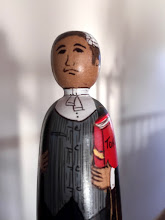With her husband dead inside the house, Merle remembers how they met and wonders why things went so terribly wrong ...
'And bugger that paper boy, man, whoever.' She returned inside, made tea and toast and went to the back veranda. The L-shaped
space ran the length of two sides of the Queenslander. Merle
sat at an old cane setting and sipped her tea. A few mangoes were on the table
and a dozen more were scattered about the smooth-worn floorboards. Most of the
mangoes were green; some were scratched and chewed by flying fox and possum.
‘Bob's hand
grenades’ she said absently.
She surveyed the
scene. The back yard fell away steeply below the veranda. Down there were the
neighbour’s place, the tin roofs of West End, Southbank and the river.
Brisbane city shimmered in the distance, the morning sun shard-split by the
glassed skyline. That’s not how it used to be, not how it was at the end of the
war when Bob returned from up north. Not much of a skyline then, just the
folded up country with church steeples and government buildings of stone. The Southbank
Parklands were pubs then. Pubs, warehouses and wharfs. But the roofs of West
End had remained much the same. And their back yard had stayed much the same too: the steep slope bound together by dusty buffalo grass and shrubs. And
of course there was the mango tree at the western corner of the veranda. Merle
was glad she had fought for that tree.
If Bob had had his way the place would
have been devoid of anything above waist height. He had been like that since returning from war. She could not be sure whether he was like that to start with, or
if the war had changed him. She was inclined to blame the tropics. He
had grown up there; up there in the north. Hot, wet and sunny, overgrown and
rank. You would have to keep things in check there. But perhaps the war had
played its part too.
Merle remembered
how it had been when they met. He was an 18 year old soldier, she a 16 year old
seamstress. They found each other at the ‘Ekka’: the Brisbane Royal Show of
1941. He had sidled up to her and her friends at a coconut shy and immediately
impressed with his aim and his wit. He had been equally impressed by the cut of
her dress, or rather how she filled it out and how she laughed.
She rocked backwards, loud and raucous when he handed her the carved monkey face he had won. They courted for six months and married the week he went north to the war.
They wrote to
each other weekly but the postal service ensured they read the results less
frequently. Her letters, when they arrived, were newsy and heartfelt: how the
Ekka was cancelled the next year, how she had taken a job in her father’s bank,
how she missed her husband. His letters were boys’ own stuff: about cannibals
and Generals and Japs. But most of all he wrote about his mates and the ‘barney’
in which they were all eagerly engaged – or so it seemed. He wrote rarely of
actual locations and when he did the words were cut out. But there was enough
to hint and she knew he must be in New Guinea. Though he wrote little of the actual
fighting, Merle noted that this mate or that one would disappear from
his dispatches with alarming frequency. Friends gone without explanation.



No comments:
Post a Comment